International Business Europe Essay 2022
VerifiedAdded on 2022/09/23
|12
|3041
|29
Essay
AI Summary
Contribute Materials
Your contribution can guide someone’s learning journey. Share your
documents today.
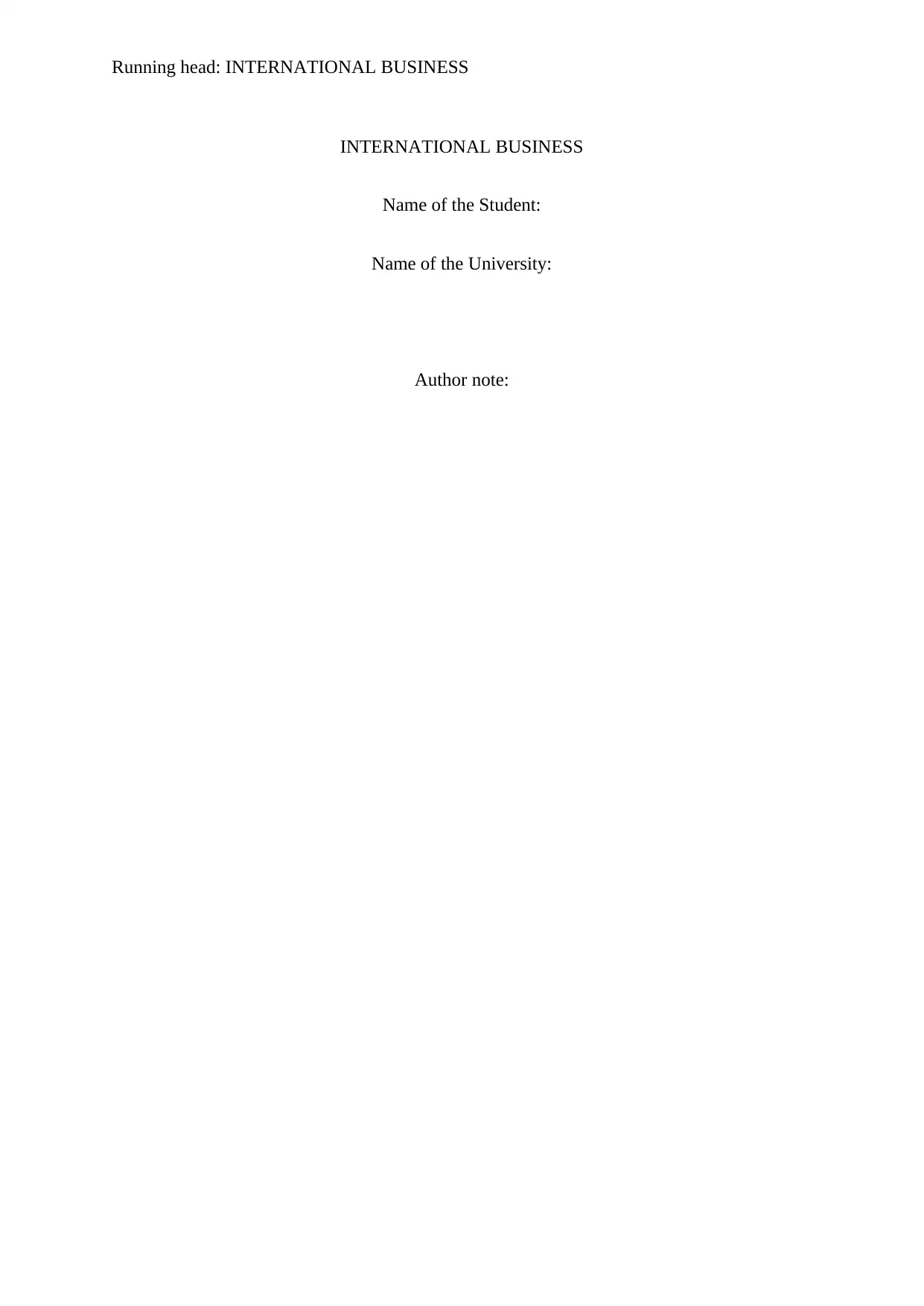
Running head: INTERNATIONAL BUSINESS
INTERNATIONAL BUSINESS
Name of the Student:
Name of the University:
Author note:
INTERNATIONAL BUSINESS
Name of the Student:
Name of the University:
Author note:
Secure Best Marks with AI Grader
Need help grading? Try our AI Grader for instant feedback on your assignments.
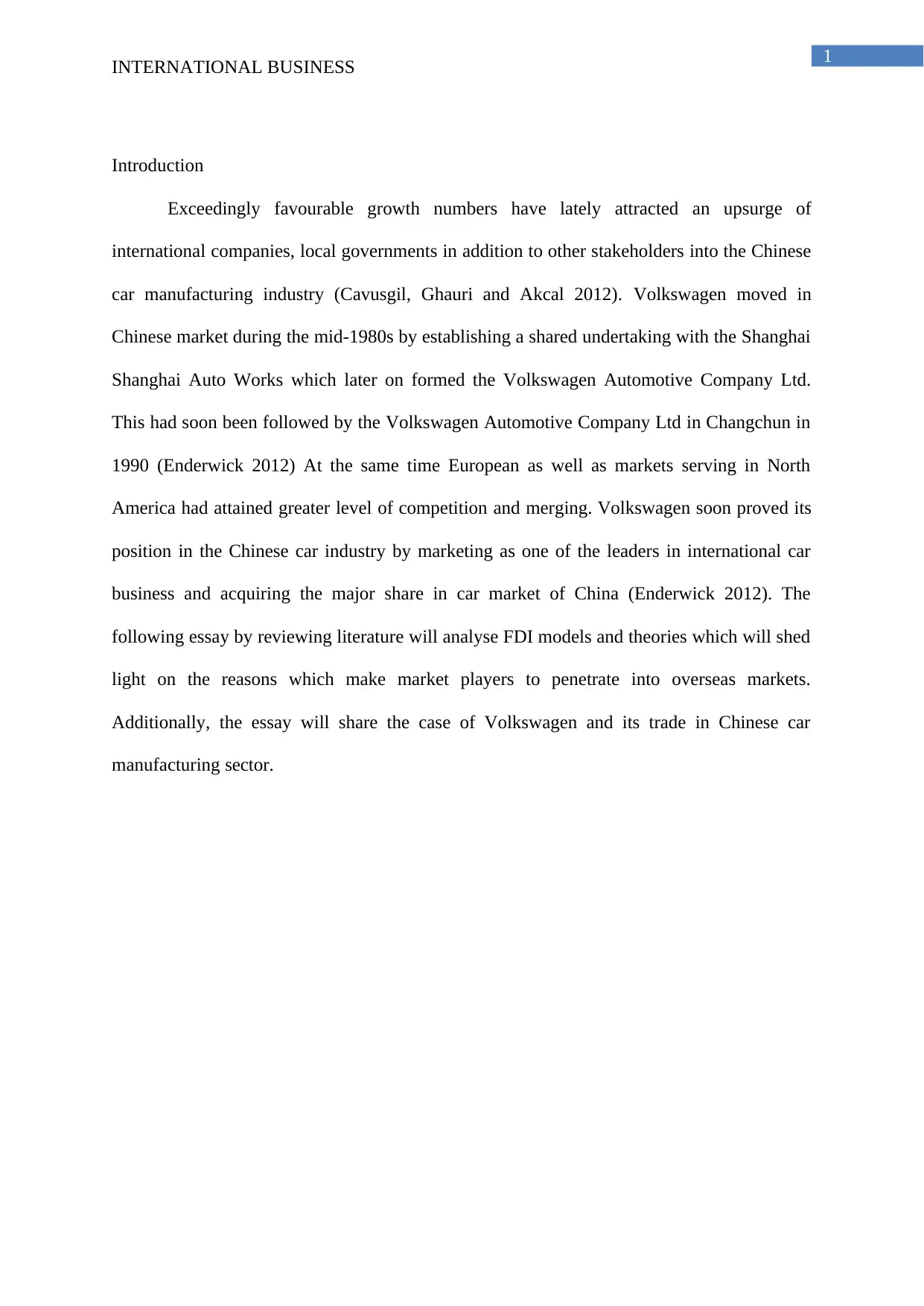
1
INTERNATIONAL BUSINESS
Introduction
Exceedingly favourable growth numbers have lately attracted an upsurge of
international companies, local governments in addition to other stakeholders into the Chinese
car manufacturing industry (Cavusgil, Ghauri and Akcal 2012). Volkswagen moved in
Chinese market during the mid-1980s by establishing a shared undertaking with the Shanghai
Shanghai Auto Works which later on formed the Volkswagen Automotive Company Ltd.
This had soon been followed by the Volkswagen Automotive Company Ltd in Changchun in
1990 (Enderwick 2012) At the same time European as well as markets serving in North
America had attained greater level of competition and merging. Volkswagen soon proved its
position in the Chinese car industry by marketing as one of the leaders in international car
business and acquiring the major share in car market of China (Enderwick 2012). The
following essay by reviewing literature will analyse FDI models and theories which will shed
light on the reasons which make market players to penetrate into overseas markets.
Additionally, the essay will share the case of Volkswagen and its trade in Chinese car
manufacturing sector.
INTERNATIONAL BUSINESS
Introduction
Exceedingly favourable growth numbers have lately attracted an upsurge of
international companies, local governments in addition to other stakeholders into the Chinese
car manufacturing industry (Cavusgil, Ghauri and Akcal 2012). Volkswagen moved in
Chinese market during the mid-1980s by establishing a shared undertaking with the Shanghai
Shanghai Auto Works which later on formed the Volkswagen Automotive Company Ltd.
This had soon been followed by the Volkswagen Automotive Company Ltd in Changchun in
1990 (Enderwick 2012) At the same time European as well as markets serving in North
America had attained greater level of competition and merging. Volkswagen soon proved its
position in the Chinese car industry by marketing as one of the leaders in international car
business and acquiring the major share in car market of China (Enderwick 2012). The
following essay by reviewing literature will analyse FDI models and theories which will shed
light on the reasons which make market players to penetrate into overseas markets.
Additionally, the essay will share the case of Volkswagen and its trade in Chinese car
manufacturing sector.
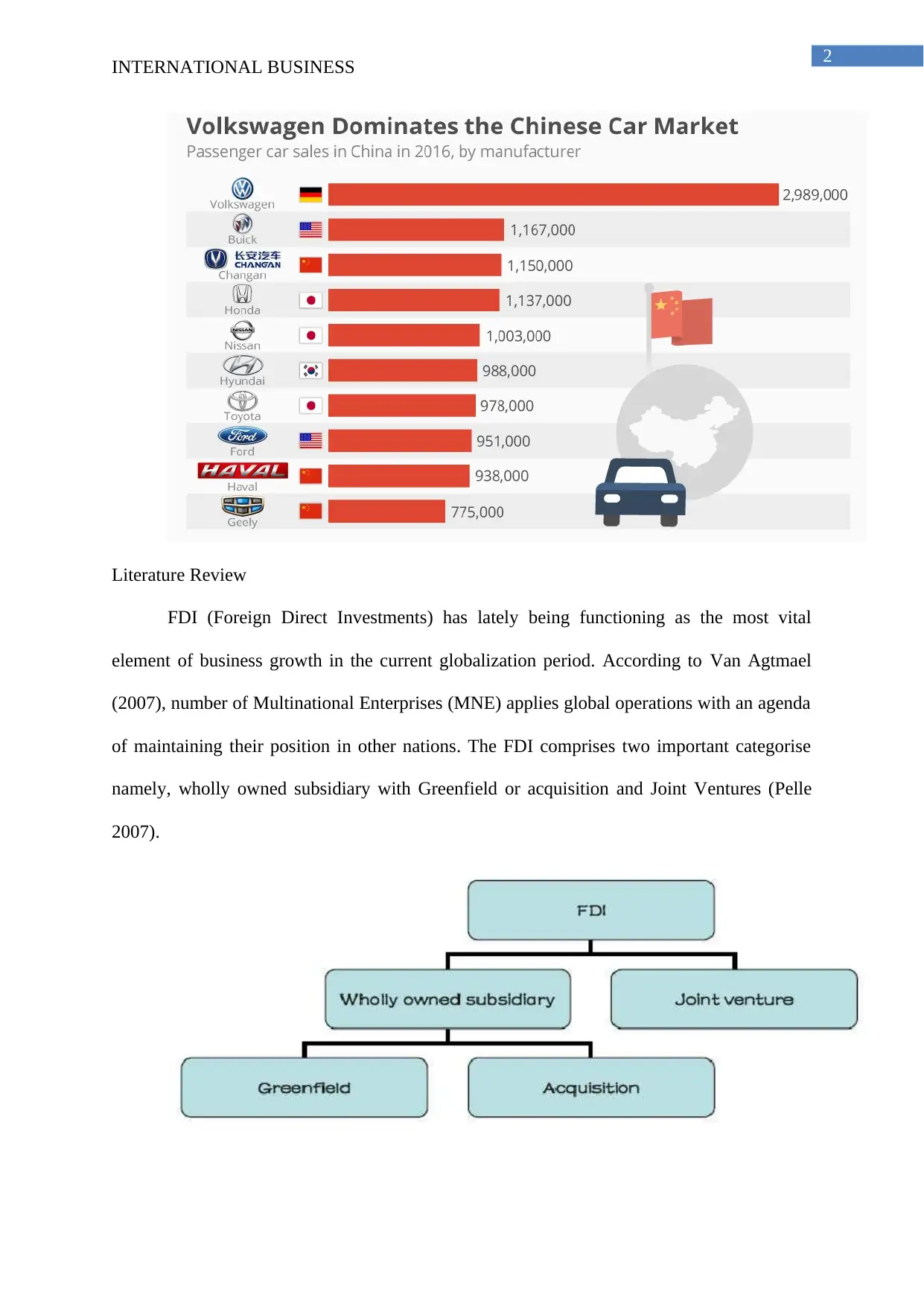
2
INTERNATIONAL BUSINESS
Literature Review
FDI (Foreign Direct Investments) has lately being functioning as the most vital
element of business growth in the current globalization period. According to Van Agtmael
(2007), number of Multinational Enterprises (MNE) applies global operations with an agenda
of maintaining their position in other nations. The FDI comprises two important categorise
namely, wholly owned subsidiary with Greenfield or acquisition and Joint Ventures (Pelle
2007).
INTERNATIONAL BUSINESS
Literature Review
FDI (Foreign Direct Investments) has lately being functioning as the most vital
element of business growth in the current globalization period. According to Van Agtmael
(2007), number of Multinational Enterprises (MNE) applies global operations with an agenda
of maintaining their position in other nations. The FDI comprises two important categorise
namely, wholly owned subsidiary with Greenfield or acquisition and Joint Ventures (Pelle
2007).
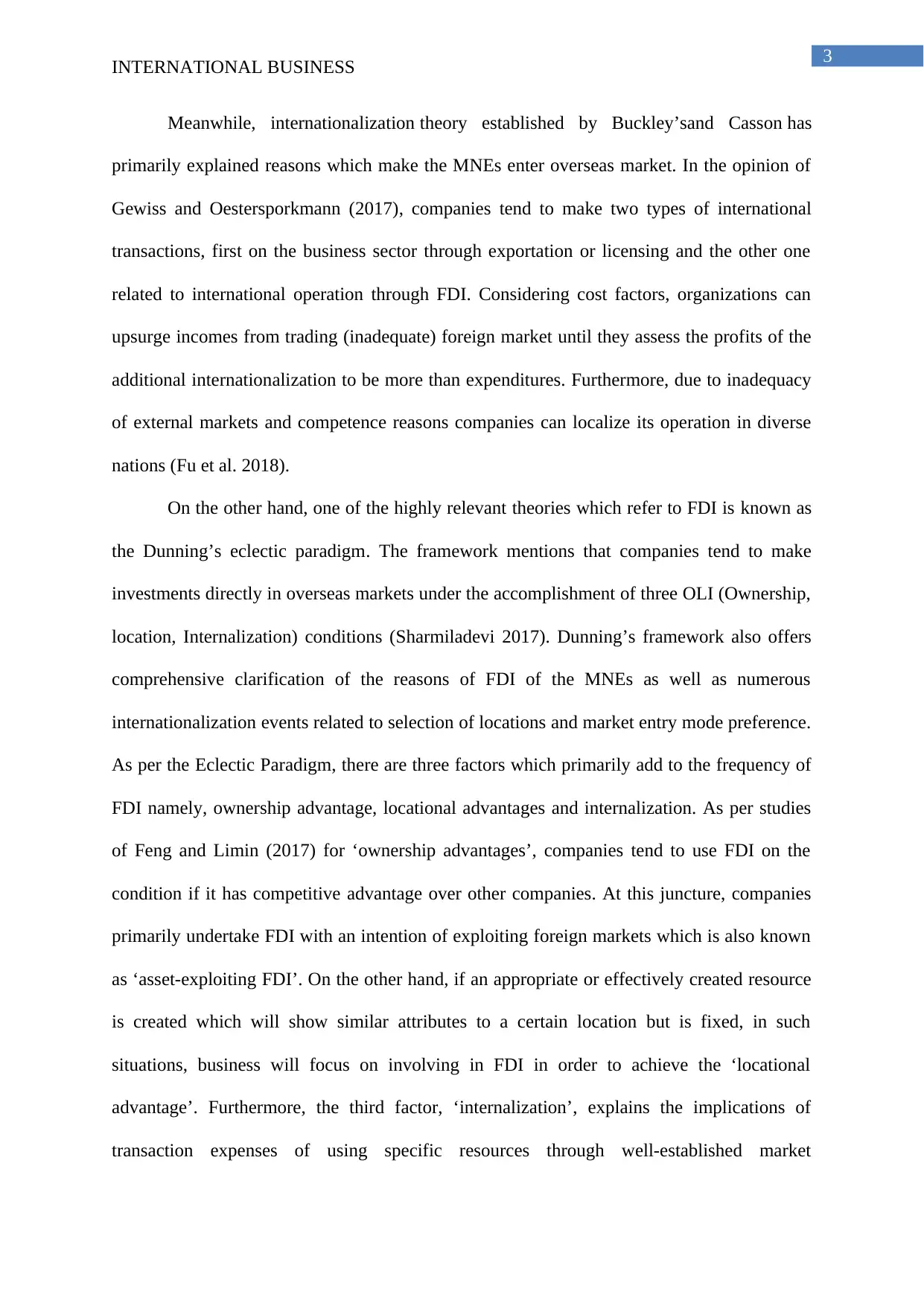
3
INTERNATIONAL BUSINESS
Meanwhile, internationalization theory established by Buckley’sand Casson has
primarily explained reasons which make the MNEs enter overseas market. In the opinion of
Gewiss and Oestersporkmann (2017), companies tend to make two types of international
transactions, first on the business sector through exportation or licensing and the other one
related to international operation through FDI. Considering cost factors, organizations can
upsurge incomes from trading (inadequate) foreign market until they assess the profits of the
additional internationalization to be more than expenditures. Furthermore, due to inadequacy
of external markets and competence reasons companies can localize its operation in diverse
nations (Fu et al. 2018).
On the other hand, one of the highly relevant theories which refer to FDI is known as
the Dunning’s eclectic paradigm. The framework mentions that companies tend to make
investments directly in overseas markets under the accomplishment of three OLI (Ownership,
location, Internalization) conditions (Sharmiladevi 2017). Dunning’s framework also offers
comprehensive clarification of the reasons of FDI of the MNEs as well as numerous
internationalization events related to selection of locations and market entry mode preference.
As per the Eclectic Paradigm, there are three factors which primarily add to the frequency of
FDI namely, ownership advantage, locational advantages and internalization. As per studies
of Feng and Limin (2017) for ‘ownership advantages’, companies tend to use FDI on the
condition if it has competitive advantage over other companies. At this juncture, companies
primarily undertake FDI with an intention of exploiting foreign markets which is also known
as ‘asset-exploiting FDI’. On the other hand, if an appropriate or effectively created resource
is created which will show similar attributes to a certain location but is fixed, in such
situations, business will focus on involving in FDI in order to achieve the ‘locational
advantage’. Furthermore, the third factor, ‘internalization’, explains the implications of
transaction expenses of using specific resources through well-established market
INTERNATIONAL BUSINESS
Meanwhile, internationalization theory established by Buckley’sand Casson has
primarily explained reasons which make the MNEs enter overseas market. In the opinion of
Gewiss and Oestersporkmann (2017), companies tend to make two types of international
transactions, first on the business sector through exportation or licensing and the other one
related to international operation through FDI. Considering cost factors, organizations can
upsurge incomes from trading (inadequate) foreign market until they assess the profits of the
additional internationalization to be more than expenditures. Furthermore, due to inadequacy
of external markets and competence reasons companies can localize its operation in diverse
nations (Fu et al. 2018).
On the other hand, one of the highly relevant theories which refer to FDI is known as
the Dunning’s eclectic paradigm. The framework mentions that companies tend to make
investments directly in overseas markets under the accomplishment of three OLI (Ownership,
location, Internalization) conditions (Sharmiladevi 2017). Dunning’s framework also offers
comprehensive clarification of the reasons of FDI of the MNEs as well as numerous
internationalization events related to selection of locations and market entry mode preference.
As per the Eclectic Paradigm, there are three factors which primarily add to the frequency of
FDI namely, ownership advantage, locational advantages and internalization. As per studies
of Feng and Limin (2017) for ‘ownership advantages’, companies tend to use FDI on the
condition if it has competitive advantage over other companies. At this juncture, companies
primarily undertake FDI with an intention of exploiting foreign markets which is also known
as ‘asset-exploiting FDI’. On the other hand, if an appropriate or effectively created resource
is created which will show similar attributes to a certain location but is fixed, in such
situations, business will focus on involving in FDI in order to achieve the ‘locational
advantage’. Furthermore, the third factor, ‘internalization’, explains the implications of
transaction expenses of using specific resources through well-established market
Secure Best Marks with AI Grader
Need help grading? Try our AI Grader for instant feedback on your assignments.
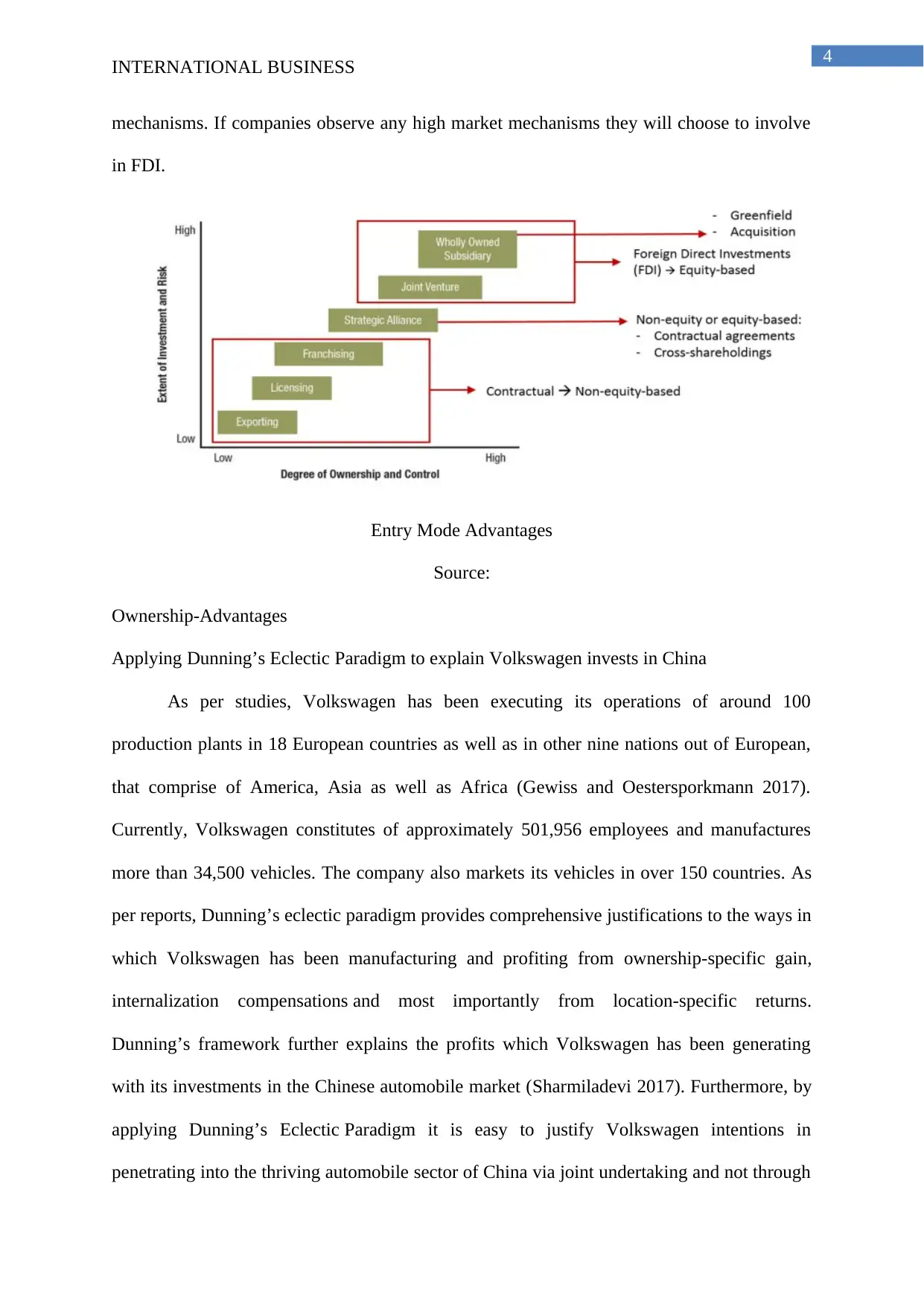
4
INTERNATIONAL BUSINESS
mechanisms. If companies observe any high market mechanisms they will choose to involve
in FDI.
Entry Mode Advantages
Source:
Ownership-Advantages
Applying Dunning’s Eclectic Paradigm to explain Volkswagen invests in China
As per studies, Volkswagen has been executing its operations of around 100
production plants in 18 European countries as well as in other nine nations out of European,
that comprise of America, Asia as well as Africa (Gewiss and Oestersporkmann 2017).
Currently, Volkswagen constitutes of approximately 501,956 employees and manufactures
more than 34,500 vehicles. The company also markets its vehicles in over 150 countries. As
per reports, Dunning’s eclectic paradigm provides comprehensive justifications to the ways in
which Volkswagen has been manufacturing and profiting from ownership-specific gain,
internalization compensations and most importantly from location-specific returns.
Dunning’s framework further explains the profits which Volkswagen has been generating
with its investments in the Chinese automobile market (Sharmiladevi 2017). Furthermore, by
applying Dunning’s Eclectic Paradigm it is easy to justify Volkswagen intentions in
penetrating into the thriving automobile sector of China via joint undertaking and not through
INTERNATIONAL BUSINESS
mechanisms. If companies observe any high market mechanisms they will choose to involve
in FDI.
Entry Mode Advantages
Source:
Ownership-Advantages
Applying Dunning’s Eclectic Paradigm to explain Volkswagen invests in China
As per studies, Volkswagen has been executing its operations of around 100
production plants in 18 European countries as well as in other nine nations out of European,
that comprise of America, Asia as well as Africa (Gewiss and Oestersporkmann 2017).
Currently, Volkswagen constitutes of approximately 501,956 employees and manufactures
more than 34,500 vehicles. The company also markets its vehicles in over 150 countries. As
per reports, Dunning’s eclectic paradigm provides comprehensive justifications to the ways in
which Volkswagen has been manufacturing and profiting from ownership-specific gain,
internalization compensations and most importantly from location-specific returns.
Dunning’s framework further explains the profits which Volkswagen has been generating
with its investments in the Chinese automobile market (Sharmiladevi 2017). Furthermore, by
applying Dunning’s Eclectic Paradigm it is easy to justify Volkswagen intentions in
penetrating into the thriving automobile sector of China via joint undertaking and not through
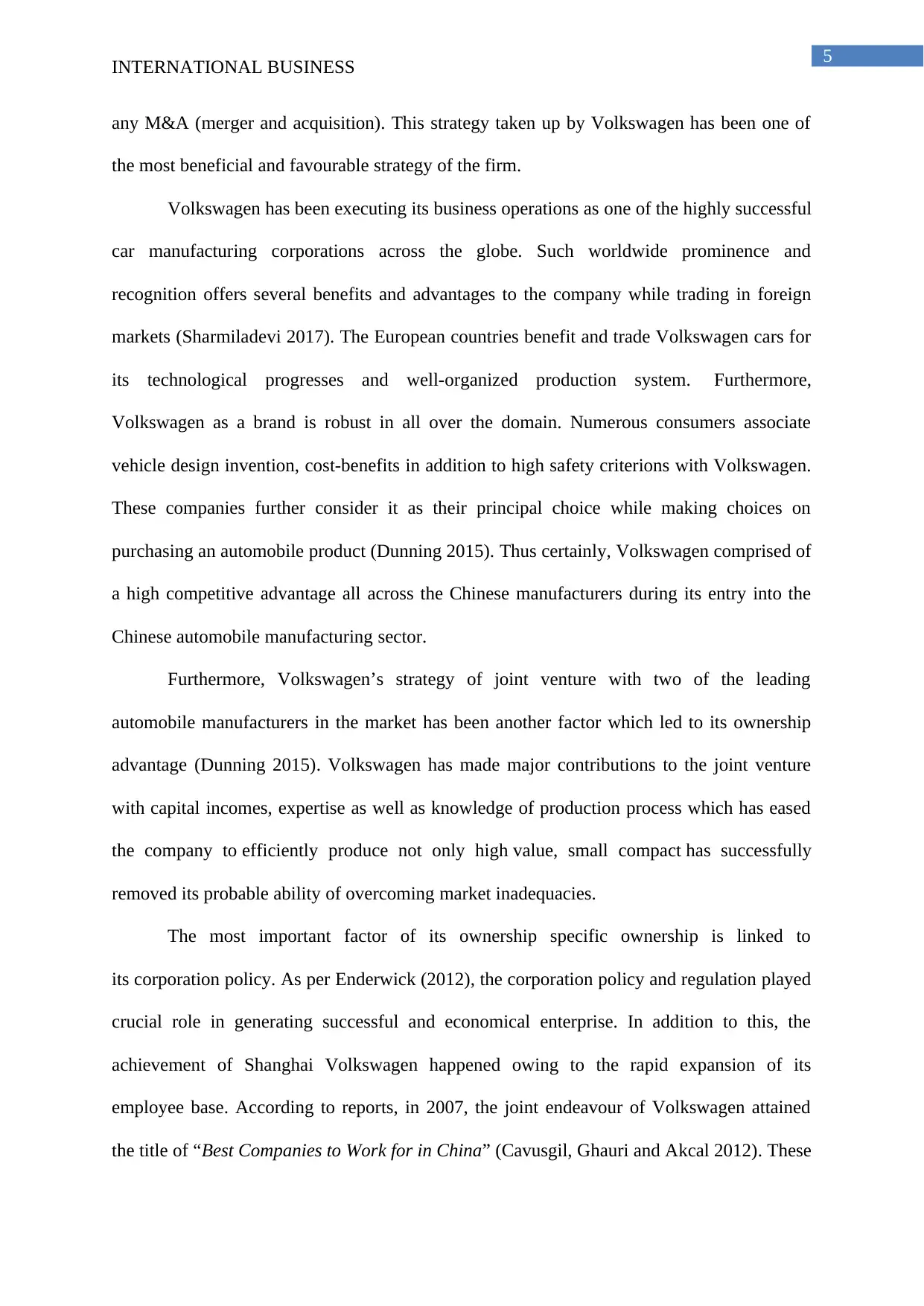
5
INTERNATIONAL BUSINESS
any M&A (merger and acquisition). This strategy taken up by Volkswagen has been one of
the most beneficial and favourable strategy of the firm.
Volkswagen has been executing its business operations as one of the highly successful
car manufacturing corporations across the globe. Such worldwide prominence and
recognition offers several benefits and advantages to the company while trading in foreign
markets (Sharmiladevi 2017). The European countries benefit and trade Volkswagen cars for
its technological progresses and well-organized production system. Furthermore,
Volkswagen as a brand is robust in all over the domain. Numerous consumers associate
vehicle design invention, cost-benefits in addition to high safety criterions with Volkswagen.
These companies further consider it as their principal choice while making choices on
purchasing an automobile product (Dunning 2015). Thus certainly, Volkswagen comprised of
a high competitive advantage all across the Chinese manufacturers during its entry into the
Chinese automobile manufacturing sector.
Furthermore, Volkswagen’s strategy of joint venture with two of the leading
automobile manufacturers in the market has been another factor which led to its ownership
advantage (Dunning 2015). Volkswagen has made major contributions to the joint venture
with capital incomes, expertise as well as knowledge of production process which has eased
the company to efficiently produce not only high value, small compact has successfully
removed its probable ability of overcoming market inadequacies.
The most important factor of its ownership specific ownership is linked to
its corporation policy. As per Enderwick (2012), the corporation policy and regulation played
crucial role in generating successful and economical enterprise. In addition to this, the
achievement of Shanghai Volkswagen happened owing to the rapid expansion of its
employee base. According to reports, in 2007, the joint endeavour of Volkswagen attained
the title of “Best Companies to Work for in China” (Cavusgil, Ghauri and Akcal 2012). These
INTERNATIONAL BUSINESS
any M&A (merger and acquisition). This strategy taken up by Volkswagen has been one of
the most beneficial and favourable strategy of the firm.
Volkswagen has been executing its business operations as one of the highly successful
car manufacturing corporations across the globe. Such worldwide prominence and
recognition offers several benefits and advantages to the company while trading in foreign
markets (Sharmiladevi 2017). The European countries benefit and trade Volkswagen cars for
its technological progresses and well-organized production system. Furthermore,
Volkswagen as a brand is robust in all over the domain. Numerous consumers associate
vehicle design invention, cost-benefits in addition to high safety criterions with Volkswagen.
These companies further consider it as their principal choice while making choices on
purchasing an automobile product (Dunning 2015). Thus certainly, Volkswagen comprised of
a high competitive advantage all across the Chinese manufacturers during its entry into the
Chinese automobile manufacturing sector.
Furthermore, Volkswagen’s strategy of joint venture with two of the leading
automobile manufacturers in the market has been another factor which led to its ownership
advantage (Dunning 2015). Volkswagen has made major contributions to the joint venture
with capital incomes, expertise as well as knowledge of production process which has eased
the company to efficiently produce not only high value, small compact has successfully
removed its probable ability of overcoming market inadequacies.
The most important factor of its ownership specific ownership is linked to
its corporation policy. As per Enderwick (2012), the corporation policy and regulation played
crucial role in generating successful and economical enterprise. In addition to this, the
achievement of Shanghai Volkswagen happened owing to the rapid expansion of its
employee base. According to reports, in 2007, the joint endeavour of Volkswagen attained
the title of “Best Companies to Work for in China” (Cavusgil, Ghauri and Akcal 2012). These
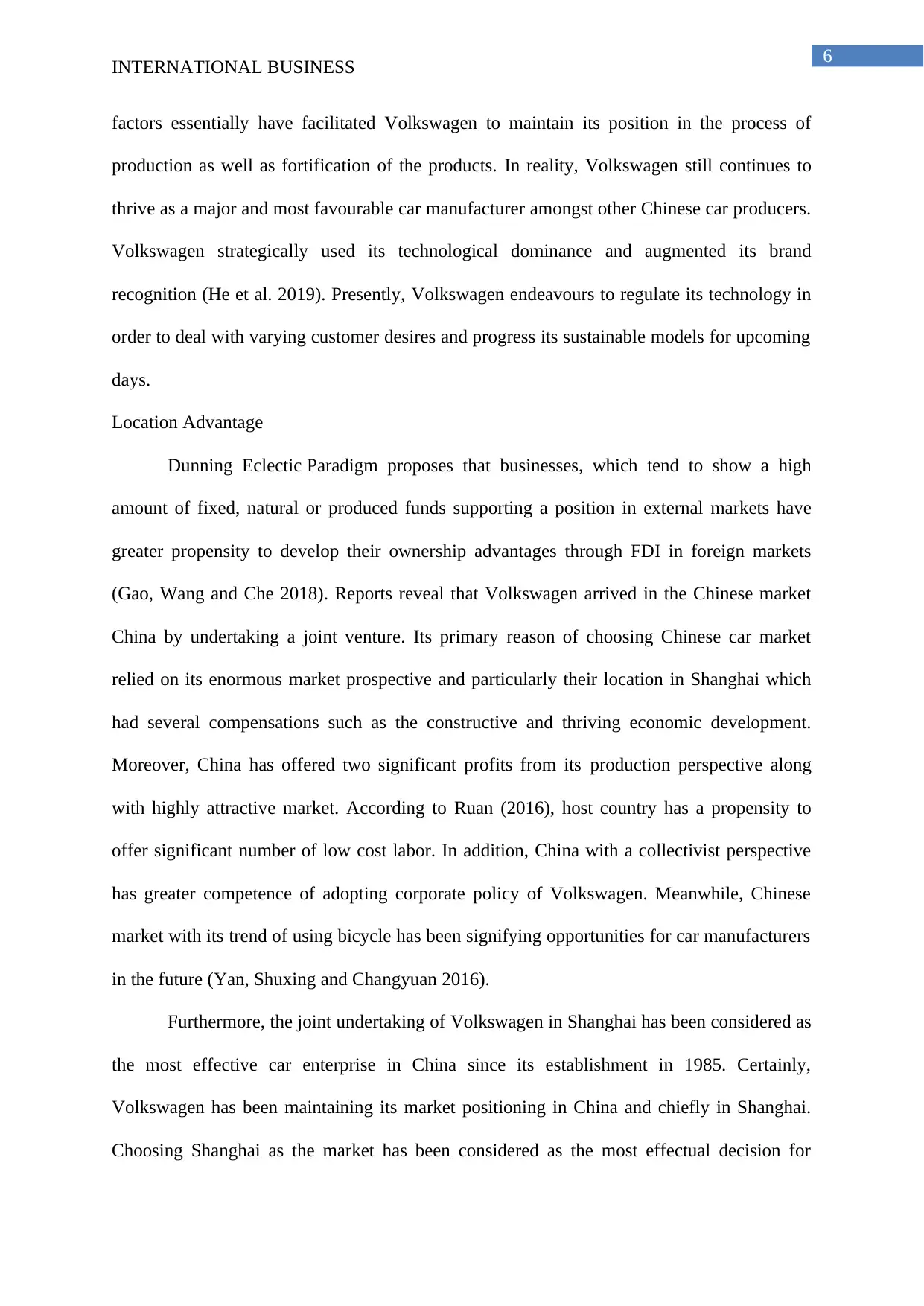
6
INTERNATIONAL BUSINESS
factors essentially have facilitated Volkswagen to maintain its position in the process of
production as well as fortification of the products. In reality, Volkswagen still continues to
thrive as a major and most favourable car manufacturer amongst other Chinese car producers.
Volkswagen strategically used its technological dominance and augmented its brand
recognition (He et al. 2019). Presently, Volkswagen endeavours to regulate its technology in
order to deal with varying customer desires and progress its sustainable models for upcoming
days.
Location Advantage
Dunning Eclectic Paradigm proposes that businesses, which tend to show a high
amount of fixed, natural or produced funds supporting a position in external markets have
greater propensity to develop their ownership advantages through FDI in foreign markets
(Gao, Wang and Che 2018). Reports reveal that Volkswagen arrived in the Chinese market
China by undertaking a joint venture. Its primary reason of choosing Chinese car market
relied on its enormous market prospective and particularly their location in Shanghai which
had several compensations such as the constructive and thriving economic development.
Moreover, China has offered two significant profits from its production perspective along
with highly attractive market. According to Ruan (2016), host country has a propensity to
offer significant number of low cost labor. In addition, China with a collectivist perspective
has greater competence of adopting corporate policy of Volkswagen. Meanwhile, Chinese
market with its trend of using bicycle has been signifying opportunities for car manufacturers
in the future (Yan, Shuxing and Changyuan 2016).
Furthermore, the joint undertaking of Volkswagen in Shanghai has been considered as
the most effective car enterprise in China since its establishment in 1985. Certainly,
Volkswagen has been maintaining its market positioning in China and chiefly in Shanghai.
Choosing Shanghai as the market has been considered as the most effectual decision for
INTERNATIONAL BUSINESS
factors essentially have facilitated Volkswagen to maintain its position in the process of
production as well as fortification of the products. In reality, Volkswagen still continues to
thrive as a major and most favourable car manufacturer amongst other Chinese car producers.
Volkswagen strategically used its technological dominance and augmented its brand
recognition (He et al. 2019). Presently, Volkswagen endeavours to regulate its technology in
order to deal with varying customer desires and progress its sustainable models for upcoming
days.
Location Advantage
Dunning Eclectic Paradigm proposes that businesses, which tend to show a high
amount of fixed, natural or produced funds supporting a position in external markets have
greater propensity to develop their ownership advantages through FDI in foreign markets
(Gao, Wang and Che 2018). Reports reveal that Volkswagen arrived in the Chinese market
China by undertaking a joint venture. Its primary reason of choosing Chinese car market
relied on its enormous market prospective and particularly their location in Shanghai which
had several compensations such as the constructive and thriving economic development.
Moreover, China has offered two significant profits from its production perspective along
with highly attractive market. According to Ruan (2016), host country has a propensity to
offer significant number of low cost labor. In addition, China with a collectivist perspective
has greater competence of adopting corporate policy of Volkswagen. Meanwhile, Chinese
market with its trend of using bicycle has been signifying opportunities for car manufacturers
in the future (Yan, Shuxing and Changyuan 2016).
Furthermore, the joint undertaking of Volkswagen in Shanghai has been considered as
the most effective car enterprise in China since its establishment in 1985. Certainly,
Volkswagen has been maintaining its market positioning in China and chiefly in Shanghai.
Choosing Shanghai as the market has been considered as the most effectual decision for
Paraphrase This Document
Need a fresh take? Get an instant paraphrase of this document with our AI Paraphraser
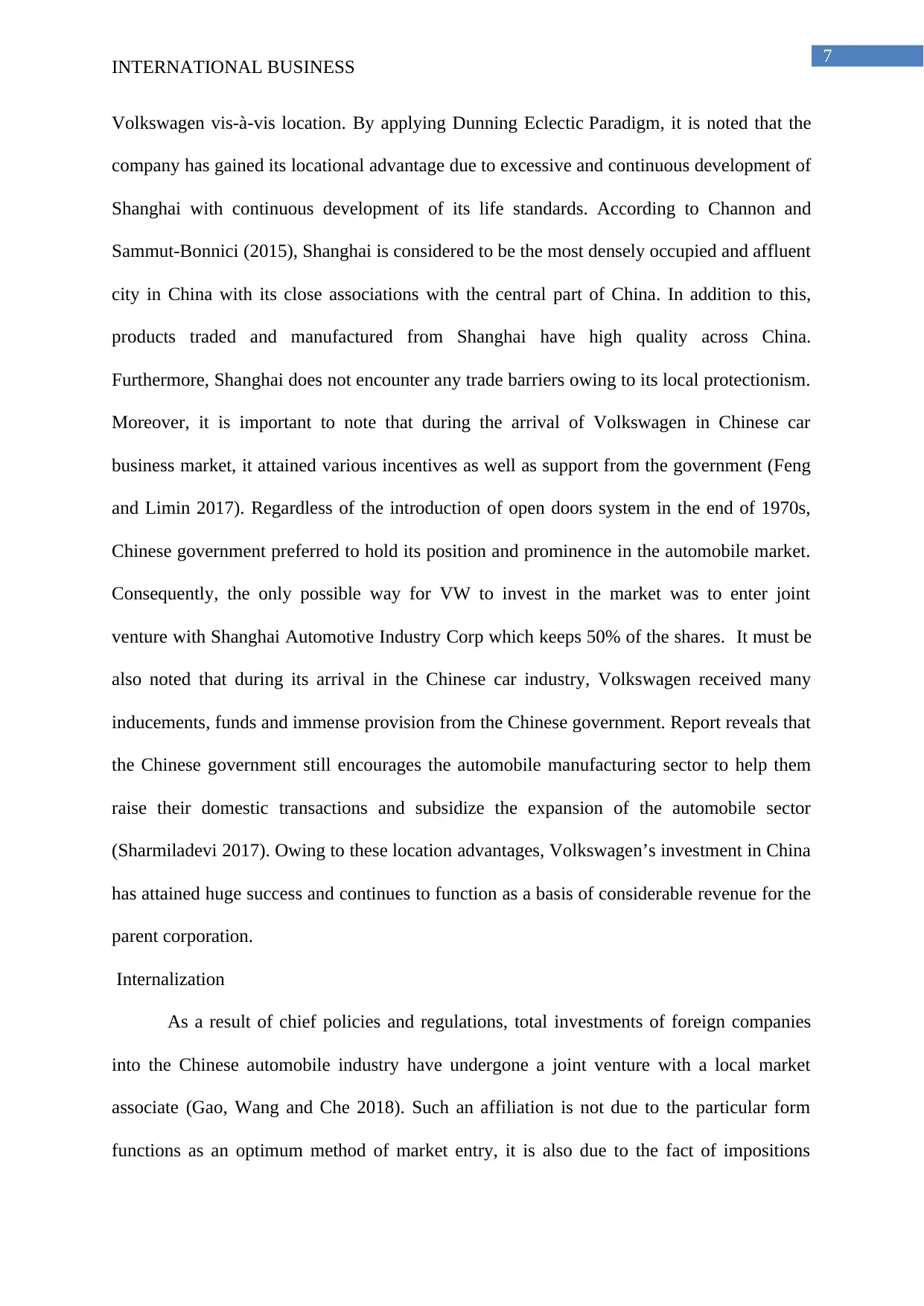
7
INTERNATIONAL BUSINESS
Volkswagen vis-à-vis location. By applying Dunning Eclectic Paradigm, it is noted that the
company has gained its locational advantage due to excessive and continuous development of
Shanghai with continuous development of its life standards. According to Channon and
Sammut‐Bonnici (2015), Shanghai is considered to be the most densely occupied and affluent
city in China with its close associations with the central part of China. In addition to this,
products traded and manufactured from Shanghai have high quality across China.
Furthermore, Shanghai does not encounter any trade barriers owing to its local protectionism.
Moreover, it is important to note that during the arrival of Volkswagen in Chinese car
business market, it attained various incentives as well as support from the government (Feng
and Limin 2017). Regardless of the introduction of open doors system in the end of 1970s,
Chinese government preferred to hold its position and prominence in the automobile market.
Consequently, the only possible way for VW to invest in the market was to enter joint
venture with Shanghai Automotive Industry Corp which keeps 50% of the shares. It must be
also noted that during its arrival in the Chinese car industry, Volkswagen received many
inducements, funds and immense provision from the Chinese government. Report reveals that
the Chinese government still encourages the automobile manufacturing sector to help them
raise their domestic transactions and subsidize the expansion of the automobile sector
(Sharmiladevi 2017). Owing to these location advantages, Volkswagen’s investment in China
has attained huge success and continues to function as a basis of considerable revenue for the
parent corporation.
Internalization
As a result of chief policies and regulations, total investments of foreign companies
into the Chinese automobile industry have undergone a joint venture with a local market
associate (Gao, Wang and Che 2018). Such an affiliation is not due to the particular form
functions as an optimum method of market entry, it is also due to the fact of impositions
INTERNATIONAL BUSINESS
Volkswagen vis-à-vis location. By applying Dunning Eclectic Paradigm, it is noted that the
company has gained its locational advantage due to excessive and continuous development of
Shanghai with continuous development of its life standards. According to Channon and
Sammut‐Bonnici (2015), Shanghai is considered to be the most densely occupied and affluent
city in China with its close associations with the central part of China. In addition to this,
products traded and manufactured from Shanghai have high quality across China.
Furthermore, Shanghai does not encounter any trade barriers owing to its local protectionism.
Moreover, it is important to note that during the arrival of Volkswagen in Chinese car
business market, it attained various incentives as well as support from the government (Feng
and Limin 2017). Regardless of the introduction of open doors system in the end of 1970s,
Chinese government preferred to hold its position and prominence in the automobile market.
Consequently, the only possible way for VW to invest in the market was to enter joint
venture with Shanghai Automotive Industry Corp which keeps 50% of the shares. It must be
also noted that during its arrival in the Chinese car industry, Volkswagen received many
inducements, funds and immense provision from the Chinese government. Report reveals that
the Chinese government still encourages the automobile manufacturing sector to help them
raise their domestic transactions and subsidize the expansion of the automobile sector
(Sharmiladevi 2017). Owing to these location advantages, Volkswagen’s investment in China
has attained huge success and continues to function as a basis of considerable revenue for the
parent corporation.
Internalization
As a result of chief policies and regulations, total investments of foreign companies
into the Chinese automobile industry have undergone a joint venture with a local market
associate (Gao, Wang and Che 2018). Such an affiliation is not due to the particular form
functions as an optimum method of market entry, it is also due to the fact of impositions
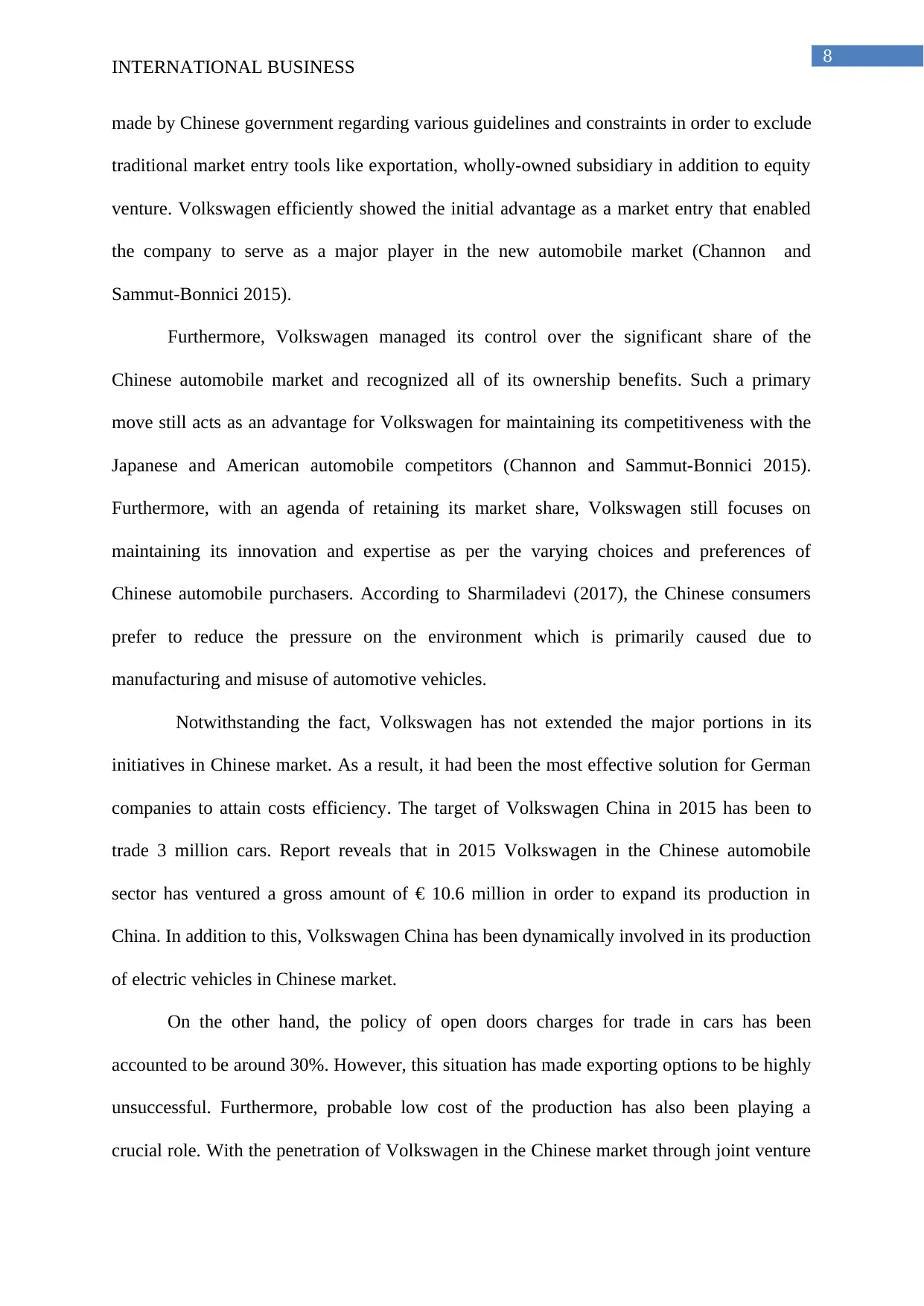
8
INTERNATIONAL BUSINESS
made by Chinese government regarding various guidelines and constraints in order to exclude
traditional market entry tools like exportation, wholly-owned subsidiary in addition to equity
venture. Volkswagen efficiently showed the initial advantage as a market entry that enabled
the company to serve as a major player in the new automobile market (Channon and
Sammut‐Bonnici 2015).
Furthermore, Volkswagen managed its control over the significant share of the
Chinese automobile market and recognized all of its ownership benefits. Such a primary
move still acts as an advantage for Volkswagen for maintaining its competitiveness with the
Japanese and American automobile competitors (Channon and Sammut‐Bonnici 2015).
Furthermore, with an agenda of retaining its market share, Volkswagen still focuses on
maintaining its innovation and expertise as per the varying choices and preferences of
Chinese automobile purchasers. According to Sharmiladevi (2017), the Chinese consumers
prefer to reduce the pressure on the environment which is primarily caused due to
manufacturing and misuse of automotive vehicles.
Notwithstanding the fact, Volkswagen has not extended the major portions in its
initiatives in Chinese market. As a result, it had been the most effective solution for German
companies to attain costs efficiency. The target of Volkswagen China in 2015 has been to
trade 3 million cars. Report reveals that in 2015 Volkswagen in the Chinese automobile
sector has ventured a gross amount of € 10.6 million in order to expand its production in
China. In addition to this, Volkswagen China has been dynamically involved in its production
of electric vehicles in Chinese market.
On the other hand, the policy of open doors charges for trade in cars has been
accounted to be around 30%. However, this situation has made exporting options to be highly
unsuccessful. Furthermore, probable low cost of the production has also been playing a
crucial role. With the penetration of Volkswagen in the Chinese market through joint venture
INTERNATIONAL BUSINESS
made by Chinese government regarding various guidelines and constraints in order to exclude
traditional market entry tools like exportation, wholly-owned subsidiary in addition to equity
venture. Volkswagen efficiently showed the initial advantage as a market entry that enabled
the company to serve as a major player in the new automobile market (Channon and
Sammut‐Bonnici 2015).
Furthermore, Volkswagen managed its control over the significant share of the
Chinese automobile market and recognized all of its ownership benefits. Such a primary
move still acts as an advantage for Volkswagen for maintaining its competitiveness with the
Japanese and American automobile competitors (Channon and Sammut‐Bonnici 2015).
Furthermore, with an agenda of retaining its market share, Volkswagen still focuses on
maintaining its innovation and expertise as per the varying choices and preferences of
Chinese automobile purchasers. According to Sharmiladevi (2017), the Chinese consumers
prefer to reduce the pressure on the environment which is primarily caused due to
manufacturing and misuse of automotive vehicles.
Notwithstanding the fact, Volkswagen has not extended the major portions in its
initiatives in Chinese market. As a result, it had been the most effective solution for German
companies to attain costs efficiency. The target of Volkswagen China in 2015 has been to
trade 3 million cars. Report reveals that in 2015 Volkswagen in the Chinese automobile
sector has ventured a gross amount of € 10.6 million in order to expand its production in
China. In addition to this, Volkswagen China has been dynamically involved in its production
of electric vehicles in Chinese market.
On the other hand, the policy of open doors charges for trade in cars has been
accounted to be around 30%. However, this situation has made exporting options to be highly
unsuccessful. Furthermore, probable low cost of the production has also been playing a
crucial role. With the penetration of Volkswagen in the Chinese market through joint venture
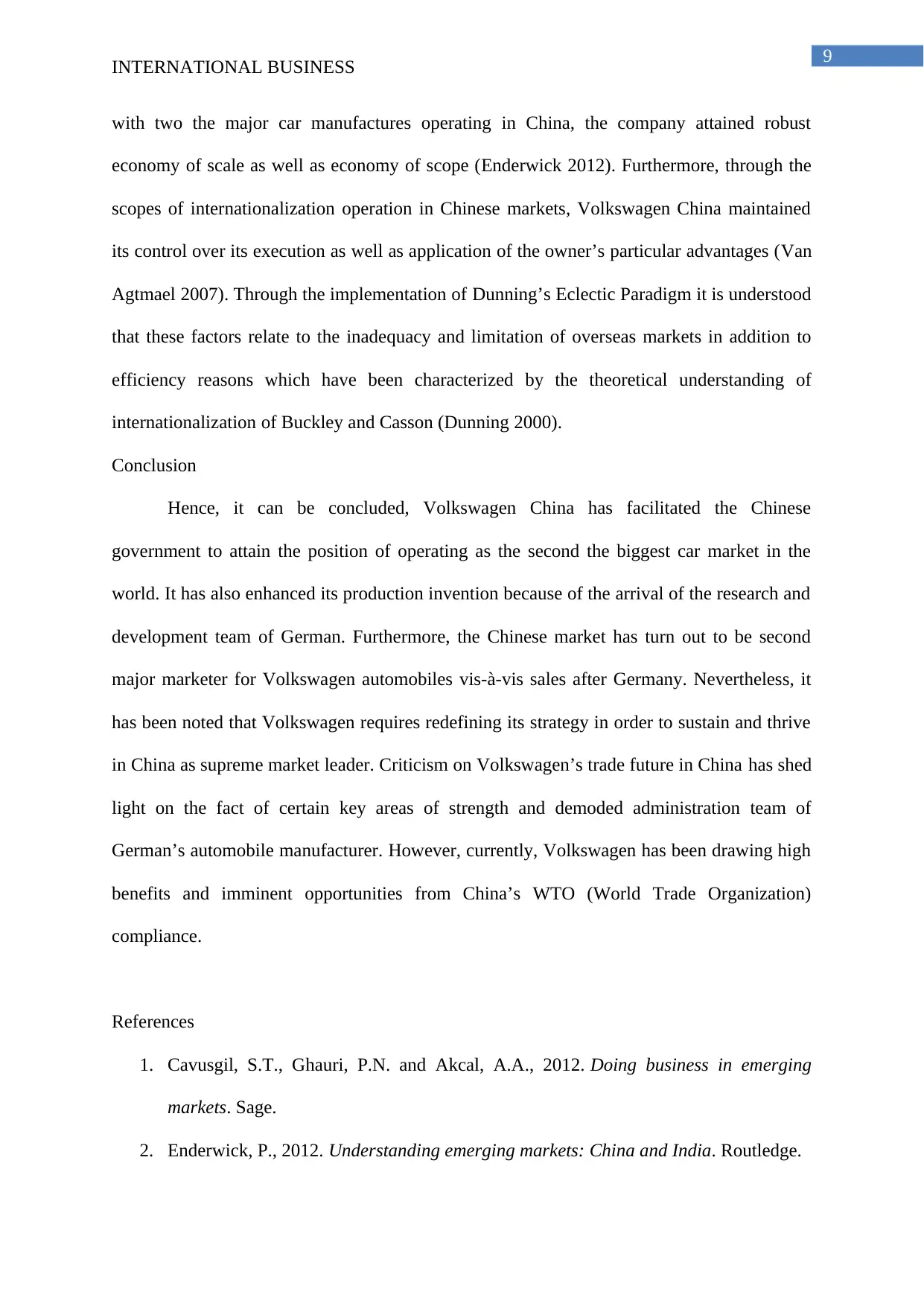
9
INTERNATIONAL BUSINESS
with two the major car manufactures operating in China, the company attained robust
economy of scale as well as economy of scope (Enderwick 2012). Furthermore, through the
scopes of internationalization operation in Chinese markets, Volkswagen China maintained
its control over its execution as well as application of the owner’s particular advantages (Van
Agtmael 2007). Through the implementation of Dunning’s Eclectic Paradigm it is understood
that these factors relate to the inadequacy and limitation of overseas markets in addition to
efficiency reasons which have been characterized by the theoretical understanding of
internationalization of Buckley and Casson (Dunning 2000).
Conclusion
Hence, it can be concluded, Volkswagen China has facilitated the Chinese
government to attain the position of operating as the second the biggest car market in the
world. It has also enhanced its production invention because of the arrival of the research and
development team of German. Furthermore, the Chinese market has turn out to be second
major marketer for Volkswagen automobiles vis-à-vis sales after Germany. Nevertheless, it
has been noted that Volkswagen requires redefining its strategy in order to sustain and thrive
in China as supreme market leader. Criticism on Volkswagen’s trade future in China has shed
light on the fact of certain key areas of strength and demoded administration team of
German’s automobile manufacturer. However, currently, Volkswagen has been drawing high
benefits and imminent opportunities from China’s WTO (World Trade Organization)
compliance.
References
1. Cavusgil, S.T., Ghauri, P.N. and Akcal, A.A., 2012. Doing business in emerging
markets. Sage.
2. Enderwick, P., 2012. Understanding emerging markets: China and India. Routledge.
INTERNATIONAL BUSINESS
with two the major car manufactures operating in China, the company attained robust
economy of scale as well as economy of scope (Enderwick 2012). Furthermore, through the
scopes of internationalization operation in Chinese markets, Volkswagen China maintained
its control over its execution as well as application of the owner’s particular advantages (Van
Agtmael 2007). Through the implementation of Dunning’s Eclectic Paradigm it is understood
that these factors relate to the inadequacy and limitation of overseas markets in addition to
efficiency reasons which have been characterized by the theoretical understanding of
internationalization of Buckley and Casson (Dunning 2000).
Conclusion
Hence, it can be concluded, Volkswagen China has facilitated the Chinese
government to attain the position of operating as the second the biggest car market in the
world. It has also enhanced its production invention because of the arrival of the research and
development team of German. Furthermore, the Chinese market has turn out to be second
major marketer for Volkswagen automobiles vis-à-vis sales after Germany. Nevertheless, it
has been noted that Volkswagen requires redefining its strategy in order to sustain and thrive
in China as supreme market leader. Criticism on Volkswagen’s trade future in China has shed
light on the fact of certain key areas of strength and demoded administration team of
German’s automobile manufacturer. However, currently, Volkswagen has been drawing high
benefits and imminent opportunities from China’s WTO (World Trade Organization)
compliance.
References
1. Cavusgil, S.T., Ghauri, P.N. and Akcal, A.A., 2012. Doing business in emerging
markets. Sage.
2. Enderwick, P., 2012. Understanding emerging markets: China and India. Routledge.
Secure Best Marks with AI Grader
Need help grading? Try our AI Grader for instant feedback on your assignments.
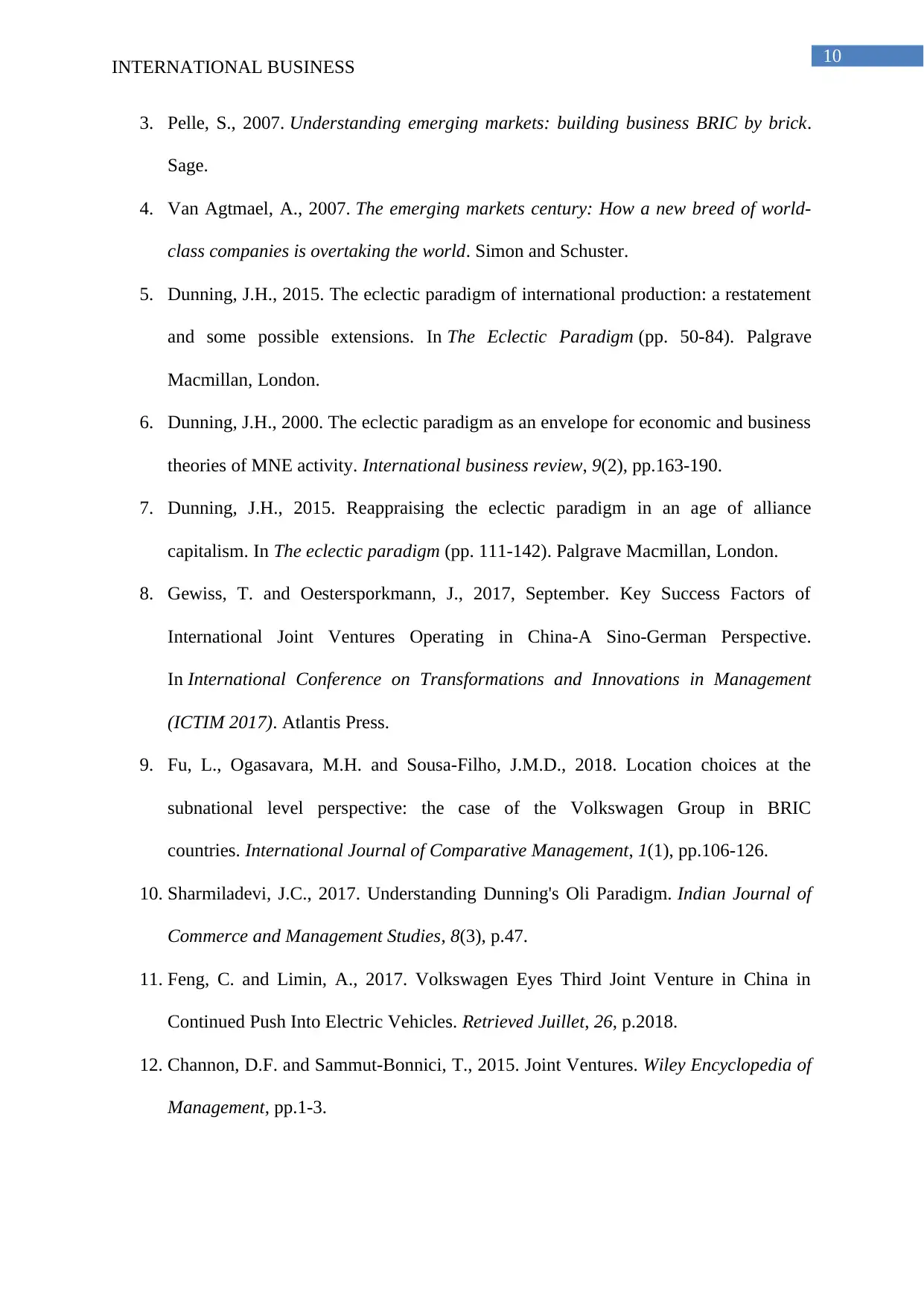
10
INTERNATIONAL BUSINESS
3. Pelle, S., 2007. Understanding emerging markets: building business BRIC by brick.
Sage.
4. Van Agtmael, A., 2007. The emerging markets century: How a new breed of world-
class companies is overtaking the world. Simon and Schuster.
5. Dunning, J.H., 2015. The eclectic paradigm of international production: a restatement
and some possible extensions. In The Eclectic Paradigm (pp. 50-84). Palgrave
Macmillan, London.
6. Dunning, J.H., 2000. The eclectic paradigm as an envelope for economic and business
theories of MNE activity. International business review, 9(2), pp.163-190.
7. Dunning, J.H., 2015. Reappraising the eclectic paradigm in an age of alliance
capitalism. In The eclectic paradigm (pp. 111-142). Palgrave Macmillan, London.
8. Gewiss, T. and Oestersporkmann, J., 2017, September. Key Success Factors of
International Joint Ventures Operating in China-A Sino-German Perspective.
In International Conference on Transformations and Innovations in Management
(ICTIM 2017). Atlantis Press.
9. Fu, L., Ogasavara, M.H. and Sousa-Filho, J.M.D., 2018. Location choices at the
subnational level perspective: the case of the Volkswagen Group in BRIC
countries. International Journal of Comparative Management, 1(1), pp.106-126.
10. Sharmiladevi, J.C., 2017. Understanding Dunning's Oli Paradigm. Indian Journal of
Commerce and Management Studies, 8(3), p.47.
11. Feng, C. and Limin, A., 2017. Volkswagen Eyes Third Joint Venture in China in
Continued Push Into Electric Vehicles. Retrieved Juillet, 26, p.2018.
12. Channon, D.F. and Sammut‐Bonnici, T., 2015. Joint Ventures. Wiley Encyclopedia of
Management, pp.1-3.
INTERNATIONAL BUSINESS
3. Pelle, S., 2007. Understanding emerging markets: building business BRIC by brick.
Sage.
4. Van Agtmael, A., 2007. The emerging markets century: How a new breed of world-
class companies is overtaking the world. Simon and Schuster.
5. Dunning, J.H., 2015. The eclectic paradigm of international production: a restatement
and some possible extensions. In The Eclectic Paradigm (pp. 50-84). Palgrave
Macmillan, London.
6. Dunning, J.H., 2000. The eclectic paradigm as an envelope for economic and business
theories of MNE activity. International business review, 9(2), pp.163-190.
7. Dunning, J.H., 2015. Reappraising the eclectic paradigm in an age of alliance
capitalism. In The eclectic paradigm (pp. 111-142). Palgrave Macmillan, London.
8. Gewiss, T. and Oestersporkmann, J., 2017, September. Key Success Factors of
International Joint Ventures Operating in China-A Sino-German Perspective.
In International Conference on Transformations and Innovations in Management
(ICTIM 2017). Atlantis Press.
9. Fu, L., Ogasavara, M.H. and Sousa-Filho, J.M.D., 2018. Location choices at the
subnational level perspective: the case of the Volkswagen Group in BRIC
countries. International Journal of Comparative Management, 1(1), pp.106-126.
10. Sharmiladevi, J.C., 2017. Understanding Dunning's Oli Paradigm. Indian Journal of
Commerce and Management Studies, 8(3), p.47.
11. Feng, C. and Limin, A., 2017. Volkswagen Eyes Third Joint Venture in China in
Continued Push Into Electric Vehicles. Retrieved Juillet, 26, p.2018.
12. Channon, D.F. and Sammut‐Bonnici, T., 2015. Joint Ventures. Wiley Encyclopedia of
Management, pp.1-3.
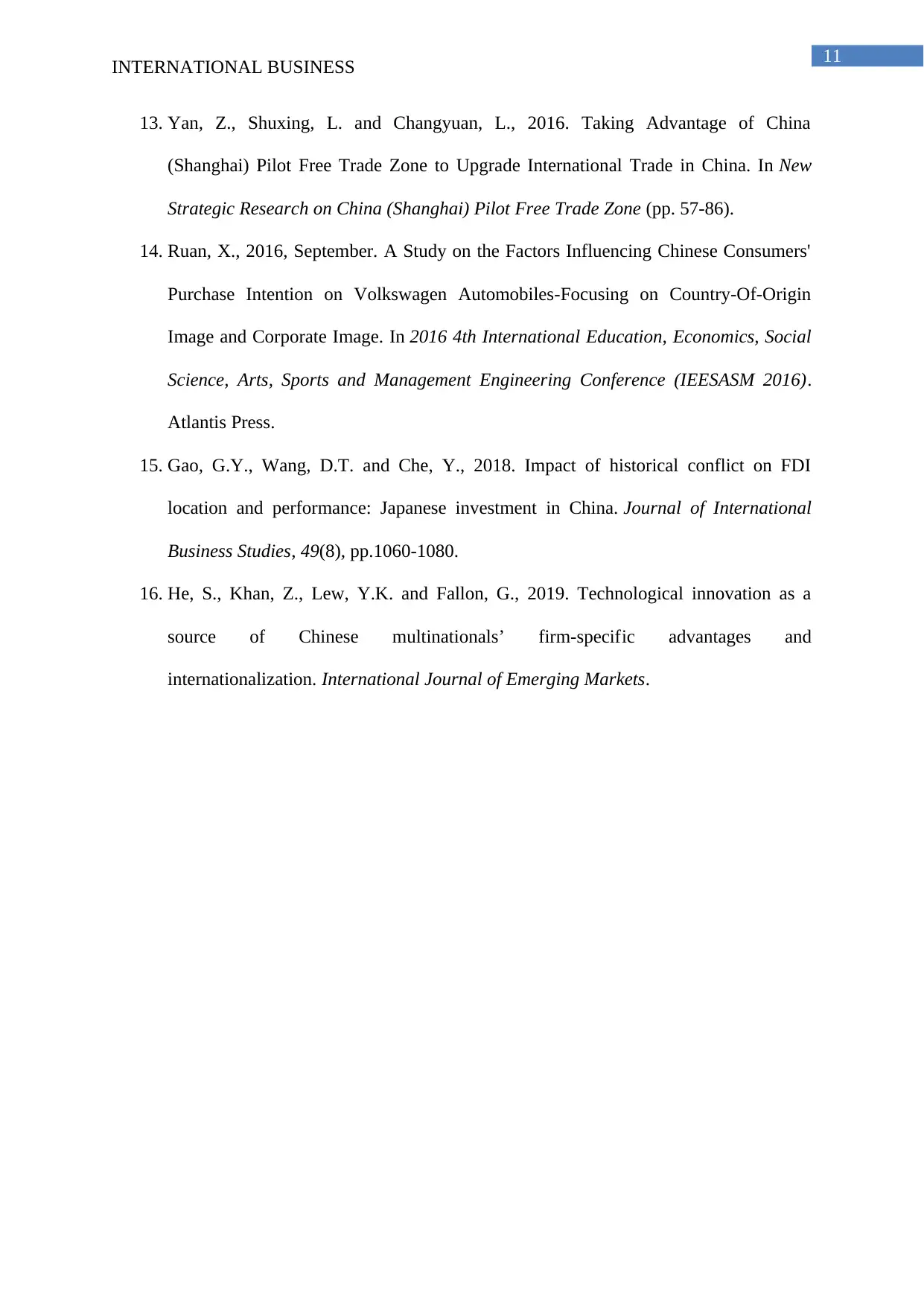
11
INTERNATIONAL BUSINESS
13. Yan, Z., Shuxing, L. and Changyuan, L., 2016. Taking Advantage of China
(Shanghai) Pilot Free Trade Zone to Upgrade International Trade in China. In New
Strategic Research on China (Shanghai) Pilot Free Trade Zone (pp. 57-86).
14. Ruan, X., 2016, September. A Study on the Factors Influencing Chinese Consumers'
Purchase Intention on Volkswagen Automobiles-Focusing on Country-Of-Origin
Image and Corporate Image. In 2016 4th International Education, Economics, Social
Science, Arts, Sports and Management Engineering Conference (IEESASM 2016).
Atlantis Press.
15. Gao, G.Y., Wang, D.T. and Che, Y., 2018. Impact of historical conflict on FDI
location and performance: Japanese investment in China. Journal of International
Business Studies, 49(8), pp.1060-1080.
16. He, S., Khan, Z., Lew, Y.K. and Fallon, G., 2019. Technological innovation as a
source of Chinese multinationals’ firm-specific advantages and
internationalization. International Journal of Emerging Markets.
INTERNATIONAL BUSINESS
13. Yan, Z., Shuxing, L. and Changyuan, L., 2016. Taking Advantage of China
(Shanghai) Pilot Free Trade Zone to Upgrade International Trade in China. In New
Strategic Research on China (Shanghai) Pilot Free Trade Zone (pp. 57-86).
14. Ruan, X., 2016, September. A Study on the Factors Influencing Chinese Consumers'
Purchase Intention on Volkswagen Automobiles-Focusing on Country-Of-Origin
Image and Corporate Image. In 2016 4th International Education, Economics, Social
Science, Arts, Sports and Management Engineering Conference (IEESASM 2016).
Atlantis Press.
15. Gao, G.Y., Wang, D.T. and Che, Y., 2018. Impact of historical conflict on FDI
location and performance: Japanese investment in China. Journal of International
Business Studies, 49(8), pp.1060-1080.
16. He, S., Khan, Z., Lew, Y.K. and Fallon, G., 2019. Technological innovation as a
source of Chinese multinationals’ firm-specific advantages and
internationalization. International Journal of Emerging Markets.
1 out of 12
Related Documents
Your All-in-One AI-Powered Toolkit for Academic Success.
+13062052269
info@desklib.com
Available 24*7 on WhatsApp / Email
![[object Object]](/_next/static/media/star-bottom.7253800d.svg)
Unlock your academic potential
© 2024 | Zucol Services PVT LTD | All rights reserved.




